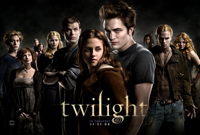Here’s the twenty seventh installment of LiteratEye, a series found only on The Art of the Prank Blog, by W.J. Elvin III, editor and publisher of FIONA: Mysteries & Curiosities of Literary Fraud & Folly and the LitFraud blog.
LiteratEye #27: The Plagiarist – A Literary Vampire?
By W.J. Elvin III
August 21, 2009
 Jordan Scott claims mega-best-selling author Stephenie Meyer stole some plot ideas for her teenage vampire romance series.
Jordan Scott claims mega-best-selling author Stephenie Meyer stole some plot ideas for her teenage vampire romance series.
Based on particulars I’ve seen, Scott’s chances of chomping into Meyer’s colossal publishing and film cake are somewhere between slim and none.
There are similarities in the story in question, but coincidence of ideas and phrases is hardly unique in literature.
Generally speaking, plagiarism has more to do with intent than with specifics. Of course there are some blatant cases, as in the one to be discussed further along here, where material is lifted practically “as is.”
Seems like any author who hits it big – Dan Brown and A.J. Rowling come immediately to mind – attracts plagiarism charges and/or lawsuits.
And there are cases in the past – Alex Haley and Roots for instance — where charges have held up. Haley settled with Harry Courlander, author of “The African,” for $650,000.
Well, let’s move on to a case where the hijacking was indisputable. Words for the Taking: The Hunt for a Plagiarist by Neal Bowers details the relentless pursuit of a plagiarist who stole poems, changing them only slightly before sending them off to small literary magazines as his own.
Bowers, a distinguished professor and highly regarded poet, was one of many poets targeted by the culprit, but he was the one who, like Howard Beale in Network, got mad as hell and damn well wasn’t going to take it anymore.
The book has its highs and lows as a page-turner but overall it’s a winner — if you’re likely to be fascinated by a nuts-and-bolts, sometimes unnerving, sometimes shocking tale of detection of literary fraud.
Unnerving because there come times when you think, why doesn’t the guy just give up?
A good, memorable poem (let’s not get into what that means) may yield a few bucks when published, more likely just a couple of contributor copies of the publication. Why spend thousands of dollars (over $4,000 in lawyer fees alone, private detective fee not given) and years of your life tracking a thief?
Bowers makes clear that it isn’t about the money.
It helps understand the situation if you allow a little sentiment in. One of the stolen poems was a memorial – an elegy — for his father, a priceless expression that emerged from a deep emotional well.
As for shocking, there are two distinct aspects. Foremost is the slithery deviousness of the perpetrator whose unrepentant dark side is gradually brought to light. Frankly, he doesn’t come off as having more than one side.
Bower’s quarry was initially “David Sumner” but other pen names – in this case, “aliases” is more the appropriate term — male and female, emerged in the course of pursuit. Who knows how many names and thefts haven’t been discovered – “Sumner” peppered the market with purloined poems.
Also somewhat astonishing is the indifference Bowers encountered on the part of colleagues and editors of poetry publications. When he did get responses from hoaxed editors, they were often “distressing and occasionally offensive.”
He repays many of them, naming names. And he makes a punchy point: Those who shrug off or otherwise excuse such thefts are accomplices to it.
Probably the most exasperating of responses were those of academics who, in words far more lofty and explanations far more lengthy, hold that there is no such thing as originality, so plagiarism is no big deal.
Or, perhaps more politically, that literary property is an antiquated and selfish notion (except when it comes to their own books or essays, of course).
Well, sure, words belong to everyone. But the arrangement of them, whether as art or craft, is personal.
Serious or playful, writing is work, writing has value.
Doesn’t anyone who puts value on his or her work get bent out of shape if it’s ripped it off and claimed by someone else?
Not necessarily. These days, seems like there’s a culture-war line in the sand drawn between those who hold a traditional view and those who believe everything belongs to everybody.
Me? I think plagiarism where there is dishonest intent (as per the Oxford Dictionary of Literary Terms) is theft. To me, the ground gets shakier in areas like the learning process of imitation, or failure to attribute every bit and piece of research.
But theft of another’s material, whether for fame or profit or to meet a pressing homework deadline, is a crime.
True, you’re not going to get screaming sirens and flashing lights if you call 911 about it.
However, if the victim happens to be someone like Neal Bowers, the perpetrator may soon wish it was just screaming sirens and flashing lights closing in.
image: teamsugar.com
(Copyright 2009 WJE, exclusive to The Art of the Prank, for reprint rights contact Literateye@gmail.com)
Check out previous LiteratEye episodes on The Art of the Prank.
